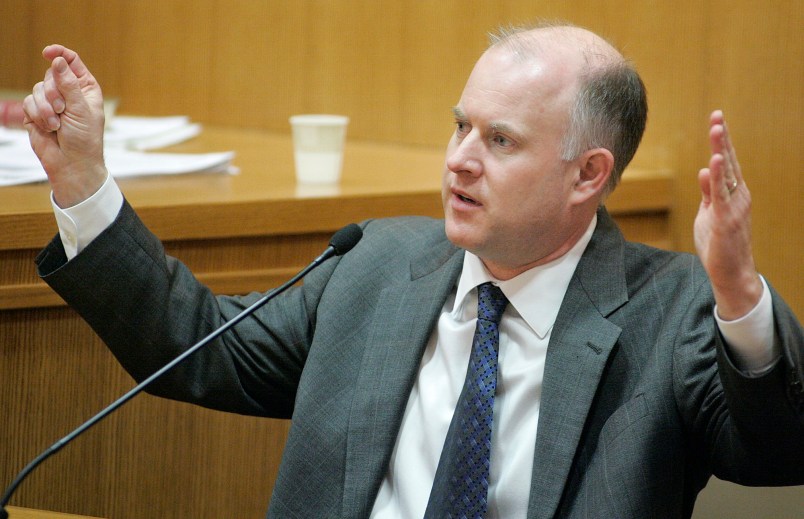Republicans in Wisconsin discussed ginning up concerns about voter fraud in the midst of a high-stakes Supreme Court race in 2011, so that if the justice they were supporting lost, they would be well-positioned to demand a recount.
The discussion occurred in a series of emails published in massive document dump by the Guardian Wednesday, alongside its report on how Gov. Scott Walker (R-WI) danced around campaign finance laws. The emails in question occurred April 6, 2011, the day after Election Day, when Wisconsin Supreme Court Justice David Prosser’s race was deemed too close to call.
The push by GOP operatives of a strategy that plays up fears of “election fraud” — which is extremely rare, but an oft-cited justification for restrictive voting laws — falls in line with what critics of voting restrictions have said for a long time: that voter fraud is not a major problem, but is instead used as an excuse by Republicans to promote a veiled agenda.
The email chain involved a collection of GOP consultants, lobbyists and former Republican lawmakers who were all backing Prosser in the technically non-partisan re-election campaign, as Prosser was seen as much friendlier to Walker’s agenda than his challenger, JoAnne Kloppenburg. In the late hours of election day, Kloppenburg appeared to be leading Prosser by a few hundred votes.
Writing from the Prosser election night party in the early hours of April 6, Scott Jensen (pictured above), a former GOP Speaker of the Wisconsin Assembly, wrote, “talk radio needs to scream the Dems are trying to steal the race.”
“The AG needs to step up and say he is working to protect the integrity of the election results,” Jensen said, according the email chain published by the Guardian.

After some back and forth about the logistics of a potential recount, Steve Baas — a lobbyist for a Milwaukee business group and former Jensen staffer — at 9:00 a.m. that morning suggested to the recipients that they start “start messaging ‘widespread reports of election fraud.’”
“Do we need to start messaging ‘widespread reports of election fraud’ so we are positively set up for the recount regardless of the final number.?” Baas wrote. “I obviously think we should.”

Jensen replied minutes later.
“Yes. Anything fishy should be highlighted. Stories should be solicited by talk radio hosts,” Jensen wrote.

In the chaos of the close re-election returns, scant evidence emerged of any legitimate voter fraud. Wisconsin Government Accountability Board director Kevin Kennedy, the state’s elections chief, said any shifts in the vote totals would be the result of human error on the part of elections’ officials.
“There will be changes because this is a very human-driven process,” Kennedy told the AP. “We expect mistakes. … Our goal will be to make sure every ballot is counted and every discrepancy on election day is accounted for.”
Ultimately, it was found that the Waukesha County clerk had erred in how she inputted the county’s initial election results, by thousands of votes, giving Prosser a comfortable lead. But in the meantime, a few conservatives floated the idea that voter fraud was at play. Brian Nemoir, Prosser’s campaign director, raised concerns about “ballot integrity.” Wall Street Journal conservative columnist John Fund, a critic of measures that make voting easier, said that there were “a lot of unanswered questions … lots of irregularities.”
Rick Hasen, an election law professor at UC-Irvine, was first to flag the operatives’ emails on his Election Law Blog Wednesday.
“It shows that all this talk of fraud is all about manipulating Republican public opinion to believe that if Democrats won a close Supreme Court race, and the recall went to a recount ,that the election was stolen by Democratic voter fraud,” Hasen wrote. “This cynical ‘messaging’ is sadly validating of what many of us have said.”
Jensen defended his comments in a statement to the State Journal, which also picked up the emails.







If any legal action were initiated as a result of the revelations in the leaked emails, would they even be permissible evidence? Asking for a friend.
This banana-republic-type activity has been sweeping the country, and it’s why we’re in the mess we’re in - a corrupt sector of the media helping the very rich in their undeclared (publicly) war against the rest of us.
As long as no one involved in the leak was involved in the legal action in question, I believe it would be admissible.
Disclaimer: Practicing law without a license is my third most favorite crime.
This finding was so predictable, yet still made me feel a bit ill.
So I want to know more about the “dancing around campaign finance rules” bit.